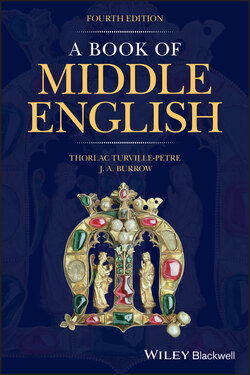Читать книгу A Book of Middle English - J. A. Burrow - Страница 72
5.6.4 Auxiliaries of the Future: shall and will
ОглавлениеThe original function of shall was to express obligation or necessity, and of will to express wish or intention, and this distinction is still often present when they are used as auxiliaries to refer to the future. Compare it schal be so!, 5/226, with ich wille bon of þe awreke, ‘I intend to get even with you’, 2/262; or the two verbs here: þu clumbe … swulc þu woldest to hævene; nu þu scalt to hælle, ‘You climbed as if you wished (to get) to heaven; now you shall (get) to hell’, 3/165–6. So shall often expresses the notion of what is bound to happen quite independent of what anyone wants: nu we scullen riden, ‘now we are going to ride’, 3/44; in the Beatitudes ‘Blessed are …’ for þay schal …, 8/16, 18, 20 etc. Shall becomes the general auxiliary of the future, whereas will still generally implies volition: wo schal us seme /þat kunne and wille riʒt us deme, ‘who is going to reconcile us, who is able and willing to judge us justly?’, 2/187–8; he wile gon a riʒte weie, ‘he intends to follow a right path’, 2/214; if þou be so bold … þou wyl grant me, 9/272–3. As this last instance shows, the sense of volition, though present, may be faint, and sometimes the two verbs occur simply as alternative auxiliaries without any apparent distinction in meaning: I wyl me sum oþer waye, … I schal tee into Tarce, ‘I’ll go some other way, … I’ll travel into Tarshish’, 8/86– 7.
A common construction contrasts will in a subordinate clause with shall in the main clause: if ʒe wyl lysten … I schal telle hit as tit, ‘if you are willing to listen … I’ll tell it at once’, 9/30–1; ʒif þou wilte besily travayle … þou schalt come þerto, ‘if you will work assiduously … you’ll get there’, 6/29–30.
For the use of will/wolde as a ‘modal auxiliary’ in hypothetical statements and the like, see 5.6.6.
